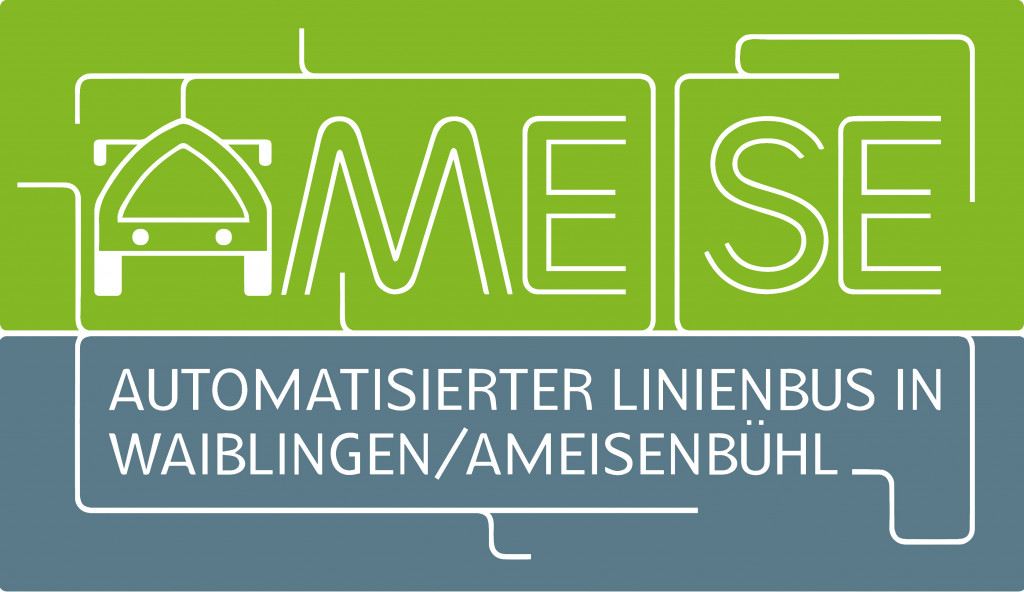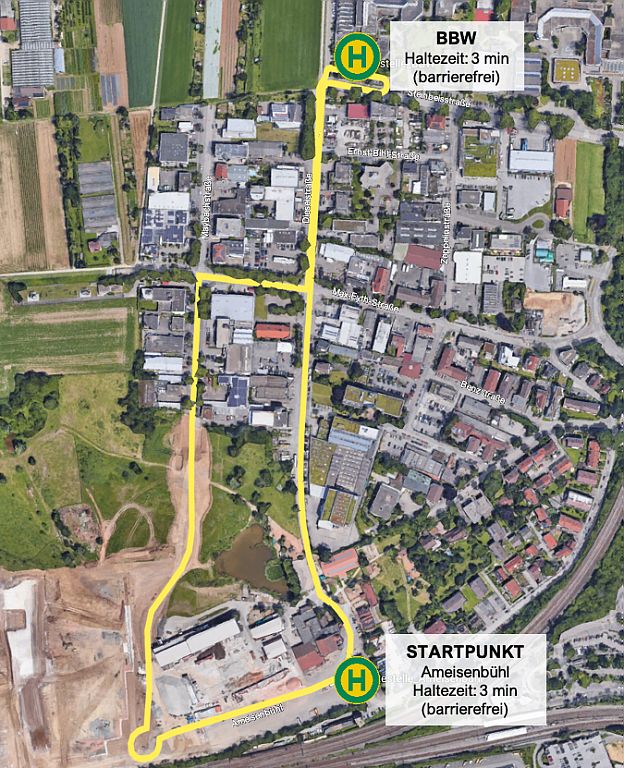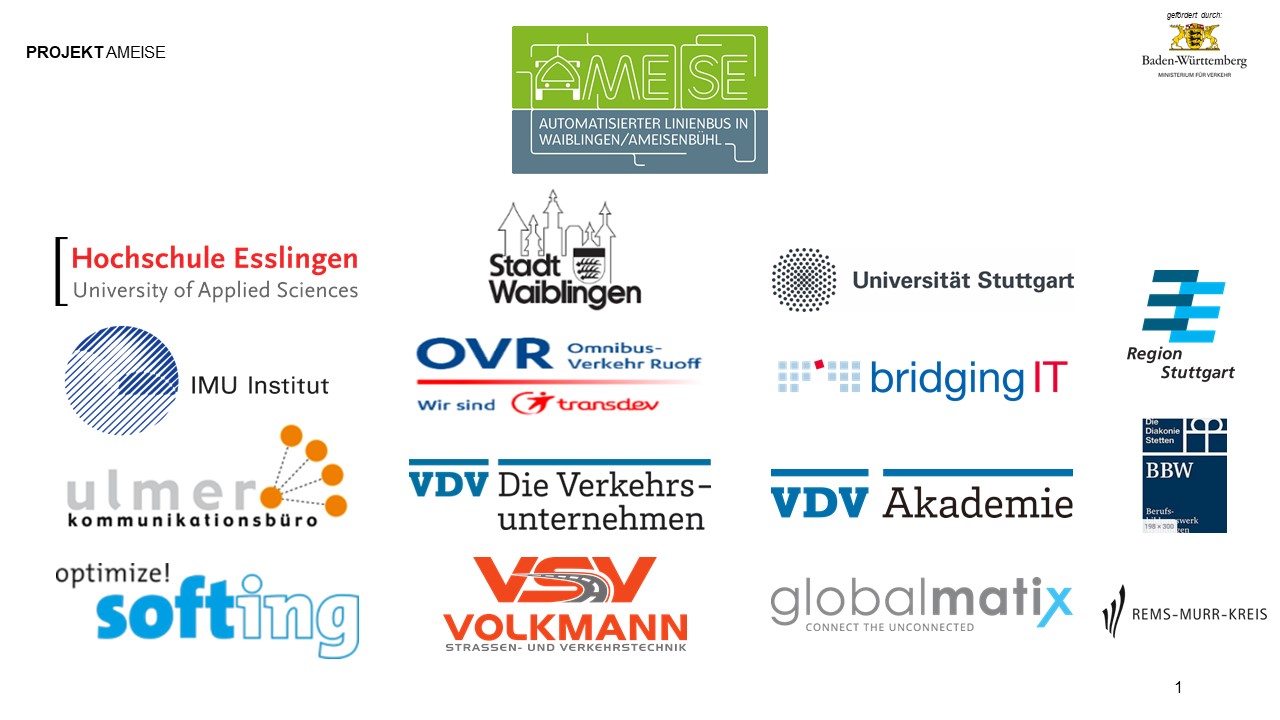"Ameise" research project Esslingen researches automated public service bus for local public transport

Prof. Dr. Ralf Wörner works with his team from the Institute of Automobile Management (IAM) and a great many partners (see text below) in Waiblingen, a small town in the Rems-Murr district, on automated driving in the local public transport system. They have a real-world laboratory where they can test and analyse the use of buses in the local public transport system.
Objectives and approach
The objective of the research project in the “Ameisenbühl” district of Waiblingen is to develop and study highly automated M2 class vehicles (small buses) with zero-emission propulsion to convey passengers in the local public transport system. The research adopts a holistic approach and involves the integration of innovative concepts for the traffic infrastructure, their incorporation into the operation of the local public transport system in the urban environment, and the involvement of local stakeholders. Inclusion is taken into account by paying particular attention to the needs of those with an impairment.
The real-world laboratory moreover affords the researchers the opportunity to increase public awareness of the new mobility service during the period stated in a dialogue-oriented process, and thus reduce any possible inhibition thresholds and people’s reluctance to accept the new system. The findings from such processes are fundamentally transferable and can thus provide positive support to comparable mobility concepts at other locations. This particularly applies in the autonomous local public transport system, since the population can experience the added values.
The economic efficiency of automated public transport systems is assessed from the point of view of traffic econometrics. The use of autonomous and (highly) automated vehicles still faces considerable challenges: this is down to the existing infrastructure as well as the technology which has been available to date. Both factors are currently still under development/in the initial phase. One part of the project aims to analyse and progressively improve the autonomous or (highly) automated driving system, especially as far as the road infrastructure is concerned. An autonomous/(highly) automated local public transport system cannot be developed and set up without developing and setting up a holistic “ecosystem”, which is why the Ameise research project has taken this as its starting point, and aims to generate knowledge and shed light on some possible approaches.
Media And Links
Further information and videos can be found at:
Short video: Simulation autonoms dirve "Apollo"
Short video: Simulation Cartograph Trim
City of Waiblingen Information
Research project network AMEISE
Youtube video: AMEISE in Waiblingen
Details of the project and the project phases

- The “Ameise Real-World Laboratory” industrial research project is due to start work in 2021.
- It will last three years.
- The overall plan is for the automated bus service in Waiblingen to have an operational lifetime of up to seven years. Two vehicles are to offer a regular, half-hourly service by travelling along a route of approx. 2 km with (initially) two planned bus stops.
- The route is intended to meet the need for a bus service from Waiblingen railway station to the vocational training centre (BBW), and the buses must be able to carry at least 6 passengers.
The first phase of theproject comprises the necessary expansion of the infrastructure (markings, traffic signs, safety measures, digital connection as per the ITS-G5 standard), the investigation and specification of suitable environment monitoring systems (from an infrastructure point of view) and their incorporation, and the setting up of a 5G mobile communications network, among other things. The planned approach for the real-world laboratory provides for transparent, socio-technical innovation processes, where those who use local public transport, the key players in the value-addition network, and further key players in the operating environment, work together on the development and application of new products, services and system solutions. An interactive and iterative innovation process will therefore take place in a real environment, and integrate the different perspectives of municipality, science and actual practice. Particular attention will be focused on developing the job profile of drivers of local public service vehicles.
Selecting the partners
Three potential vehicle suppliers have been considered as part of the vehicle strategy for the innovation platform and the contract award has been examined. The first preference is the Aachen car manufacturer e.GO Moove, and the first step is to purchase an L0 (according to SAE j3016) M2 class bus (people mover) and equip it with autonomous sensor technology. Based on passive environment recognition, where the initial aim is to understand which difficulties could arise, a feasibility study for L4 operation (according to SAE j3016) is to be produced for the complete route.
If the delivery deadlines cannot be met (by e.GOMoove), negotiations with EasyMile have already taken place in advance to guarantee L4 operation. This would mean reductions in average speed and number of passengers carried, however.
Ultimately, it may be possible to use vehicles of the Transdev Gesellschaft (type: I-Cristal) via an industrial partner (OVR), if necessary, but these are currently still at the prototype stage.

Interested? Apply now! for the wintersemester 2025/2026
Get started
find a course